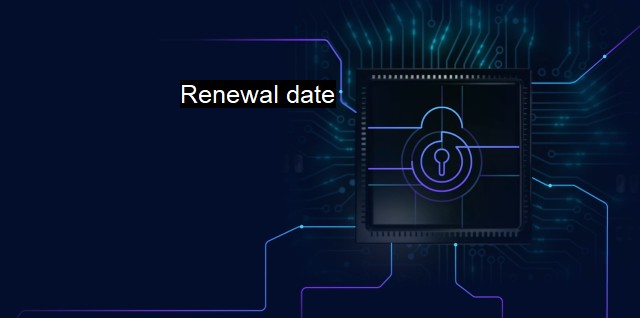What is Renewal date?
The Significance of The Renewal Date in Cybersecurity and Antivirus Solutions: A Comprehensive Analysis of the Importance of Keeping Antivirus Software Up-to-Date.
Renewal date is a term used to describe the date at which a particular service or contract needs to be renewed or extended. the renewal date typically refers to the time when a subscription or license for software or service is due for renewal. Understanding the concept of a renewal date is crucial because it dictates the continuity of protection that cybersecurity and antivirus software provides.Cybersecurity is the practice of protecting computer systems, networks, and programs by mitigating vulnerability to attacks from cybercriminals. With the advent of digitalization and the increasing dependence on online platforms, cybersecurity matters have become an essential component of our daily lives and businesses operations. Antivirus, an essential tool adopted for cybersecurity, is software designed to detect, prevent, and remove malicious software or files (typically called 'viruses') that may inadvertently be downloaded onto devices or systems thus risking data breaching and unauthorized intrusion.
Prior to addressing the significance of adhering to renewal date in the cybersecurity and antivirus world, it's important to review why the software is necessary in the first place. A strong antivirus program acts like a security guard, alerting and effectively countering cyber threats like viruses and malware that could otherwise cause significant harm to the system. These threats are diverse and continuously evolving, obliging antivirus software to regularly update in order to match this progression.
The license or subscription fee associated with anti-virus or cybersecurity services assists in fuelling the research, development and the constant updating of these protective measures designed to combat the dangers constantly being presented by cybercriminals. such a license or subscription is typically bound by a limited timeframe. The software continues to provide updates and protect the user until it hits the renewal date.
Once the renewal date is reached, protection may lapse, and the user's devices and networks become vulnerable to attacks. This is particularly significant as many varieties of modern threats are designed to operate undetected, meaning users may not realize they're unprotected until after unallowable access or data breach occurs. Hence, failing to renew on the set "renewal date" can leave systems unprotected and even increase the risk for harmful breaches.
This situation is made more alarming considering the rate of digital threats' metamorphosis. Antivirus software relies on a database of known issues to halt threats -- a stagnant software wouldn't have those new menaces in its data bank, offering unhindered access to harmful elements which could lead to devastating repercussions such as identity theft, financial loss, and significant data breaches.
The renewal process is not only important to maintain cybersecurity protection but also to benefit from improved features and functionalities that are often found in the updated versions of the software. Update patches provided in the renewed versions not only serve to counteract updated viruses but also fix bugs and enhance overall performance of the software.
The renewal date also often comes with customer support associated with antivirus and other cybersecurity services end. This implication suggests lack of expert-help in times of cyber crisis--when it's usually needed the most if the subscription is not duly renewed.
Thus, the "renewal date" plays a pivotal role in the protection strategy of cybersecurity and antivirus protocol. Adhering to the schedule ensures the user stays ahead of threats and sustains the highest level of possible protection for networks and systems. Failing to do so, the consequences can be significant, as in today's reality, it could lead to massive financial paralysis and infraction of privacy. Renewing an antivirus or cybersecurity service before its renewal date is, therefore, one preventive measure everyone should consider seriously.

Renewal date FAQs
What is a renewal date in the context of cybersecurity and antivirus?
A renewal date is the date on which your antivirus subscription expires and needs to be renewed in order to continue receiving updates and protection against the latest cyber threats.How do I know when my antivirus renewal date is coming up?
You can usually find your renewal date by checking your antivirus software's settings or by checking your subscription details on the vendor's website. Some vendors also send reminders via email or notifications through the software.What happens if I don't renew my antivirus subscription before the renewal date?
If you don't renew before the renewal date, your antivirus software will typically stop receiving updates and you may no longer be protected against the latest cyber threats. Depending on your vendor's policies, you may also need to purchase a new license if your subscription has completely expired.Can I change my antivirus renewal date?
It depends on the vendor's policies. Some vendors may allow you to change your renewal date or upgrade to a longer subscription period, while others may have specific terms and conditions that prohibit changing the renewal date. It's best to check with your vendor's customer support for more information.| | A | | | B | | | C | | | D | | | E | | | F | | | G | | | H | | | I | | | J | | | K | | | L | | | M | |
| | N | | | O | | | P | | | Q | | | R | | | S | | | T | | | U | | | V | | | W | | | X | | | Y | | | Z | |
| | 1 | | | 2 | | | 3 | | | 4 | | | 7 | | | 8 | | |||||||